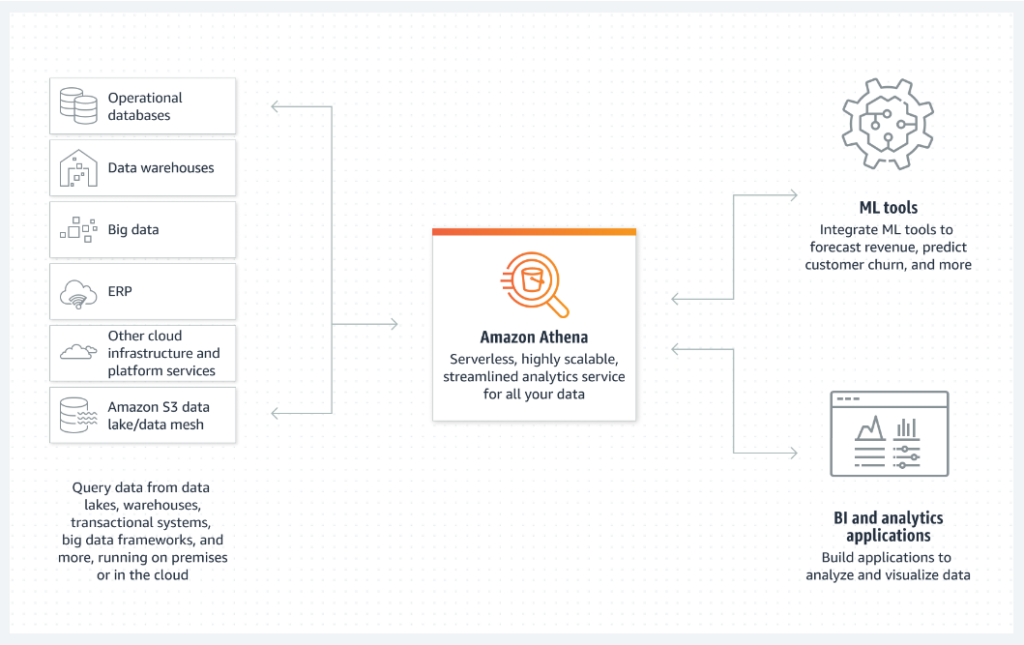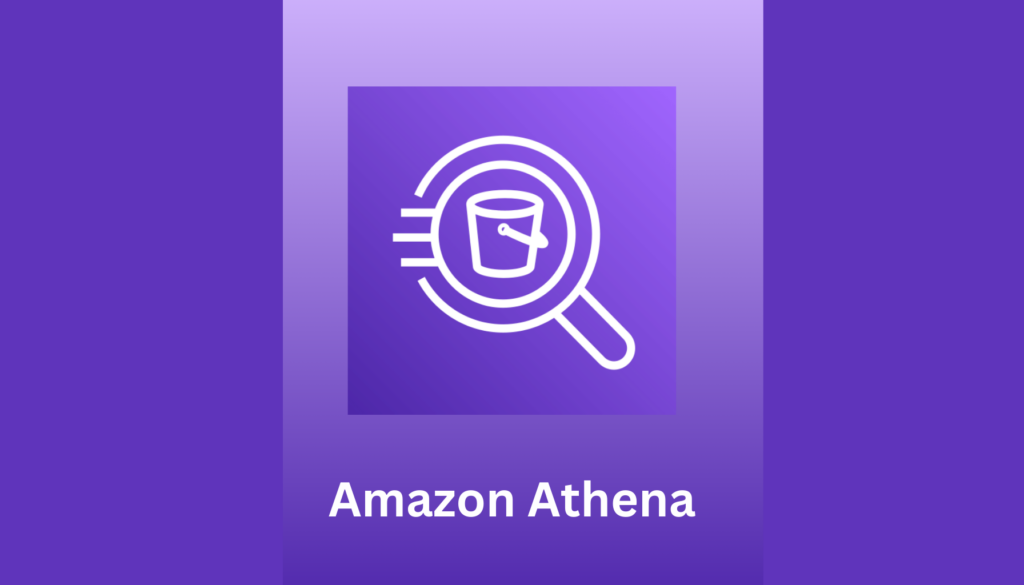What is Amazon Athena?
Amazon Athena is a serverless query service that enables easy analysis of large-scale data directly in Amazon S3 using standard SQL. Athena stands out in the AWS suite for its simplicity, scalability, and cost-effectiveness, especially for data analysts and businesses that require quick, ad-hoc access to vast data repositories without the complexities of traditional data processing and storage infrastructure.

Source: Amazon Athena
Amazon Athena Core Features
Amazon Athena provides a wide range of features that include:
- SQL Compatibility: Athena supports a wide array of SQL standards, enabling users to perform complex queries, including joins, window functions, and array processing. This compatibility ensures that users familiar with SQL can easily adapt to using Athena.
- Fast Performance: Athena is optimized for quick query execution, even over large datasets. It leverages distributed data processing, allowing it to handle large-scale data workloads efficiently.
- No Data Loading Required: Since Athena queries data directly in Amazon S3, there is no need for time-consuming data loading processes. This feature significantly reduces the time from data storage to analysis.
- Support for Various Data Formats: Athena can query data in several formats, including CSV, JSON, ORC, Avro, and Parquet. This flexibility makes it suitable for a diverse range of data analytics tasks.
- Integration with AWS Glue: AWS Glue integration allows for automatic schema discovery and easier data catalog management. This feature simplifies the process of querying datasets with complex structures.
- IAM Integration: Athena integrates with AWS Identity and Access Management (IAM), enabling fine-grained control over who can execute and manage queries. This integration ensures adherence to strict security and compliance standards.
- Encryption Options: Athena supports several encryption methods to secure data at rest and in transit, including server-side encryption with S3-managed keys (SSE-S3), AWS KMS keys, and client-side encryption.
- Automatic Scaling: Athena’s serverless architecture allows it to automatically scale computing resources to match the demands of query workloads. This scalability is crucial for handling varying data analysis demands without manual intervention.
- Cost-Effective Resource Use: With its pay-per-query pricing model, Athena ensures that users only pay for the queries they execute. This model provides a cost-effective solution for big data analytics, especially for users with intermittent querying needs.
Amazon Athena Pricing Overview
Understanding the pricing model of Amazon Athena is crucial for users to effectively budget and manage their data analysis costs. Athena’s pricing structure is distinctive because it is primarily based on the amount of data scanned by each query, aligning costs directly with usage.
AWS Athena Pricing Structure
Pay-Per-Query Model: Amazon Athena charges users based on the amount of data scanned by each query. The pricing is calculated per terabyte of data scanned. This model enables efficient query writing, as more concise queries that scan less data can reduce costs.
Data Scanned Calculation: The cost is determined by the total amount of data in bytes that Athena scans. This includes all the data scanned across all columns accessed by the query, regardless of the amount of data returned.
No Upfront Costs or Infrastructure Expenses: Since Athena is serverless, there are no costs associated with provisioning or maintaining servers or infrastructure. This aspect significantly reduces the total cost of ownership compared to traditional data warehousing solutions.
Does Amazon Athena come with a Free Tier?
Amazon Athena does not provide any free tier usage. This requires the user to pay from the get-go. Even if you stay within your S3 free tier, you still have to pay for the number of queries you run in Athena and the data scanned per query.
Cost Optimizations Strategies for Amazon Athena
While Amazon Athena’s pay-per-query model is inherently cost-effective, especially for ad-hoc querying, there are several strategies that users can adopt to further optimize costs. These optimizations revolve around reducing the amount of data scanned by queries and managing data storage efficiently.
- Partitioning Data: Organizing data into partitions based on certain columns (like date, location, etc.) can significantly reduce the amount of data scanned in each query. This approach is particularly effective for time-series data.
- Columnar Data Formats: Storing data in columnar formats such as Parquet or ORC reduces the data scanned, as these formats allow Athena to retrieve only the required columns for a query, instead of scanning entire rows.
- Data Compression: Compressing data files using formats like Snappy, GZIP, or BZIP2 can reduce the size of the data scanned, thus lowering query costs.
- Query Optimization: Writing efficient SQL queries by avoiding select-all (*) commands, using WHERE clauses effectively, and minimizing the use of costly operations like JOINs can reduce the amount of data Athena needs to process.
- Regular Data Cleanup: Periodically deleting or archiving old or irrelevant data from S3 can reduce storage costs and the volume of data scanned in queries.
- Lifecycle Policies in S3: Implementing lifecycle policies on S3 buckets to transition data to less expensive storage classes, like S3 Infrequent Access or S3 Glacier, can reduce storage costs without impacting query performance significantly.
- Cost Allocation Tags: Using cost allocation tags for S3 buckets and Athena queries can help in tracking and attributing costs, enabling more precise budgeting and cost optimization strategies.
Conclusion
Amazon Athena is a great choice for data analysis, offering easy and efficient querying. It’s cost-effective as you pay for each query, but remember, there’s no free usage tier like some other AWS services. So, managing your queries well can help keep costs down. We advise seeking advice from experts before making any significant decisions. They can help you get the most out of your budget and make sure everything works well.
Ready to elevate your AWS strategy?
[Reach out] for specialized guidance to ensure your setup is both cost-effective and high-performing.

